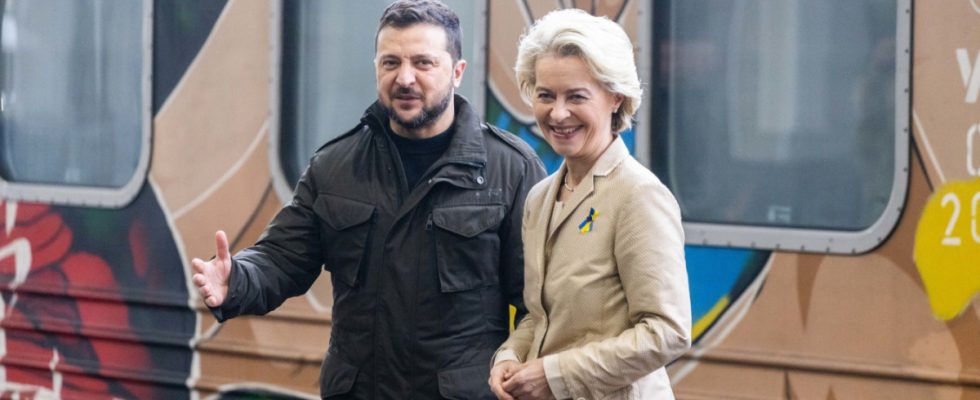At the beginning of November, EU Commission President Ursula von der Leyen made a plea in the Ukrainian parliament for the country to join the EU. She said she was confident that accession negotiations with Ukraine could begin this year. Almost all MPs stood and applauded, some holding European flags in the air. The appearance left no doubt that the European Commission wants to pave the way for Ukraine to join the EU as quickly as possible.
But the EU wouldn’t be the EU if the member states didn’t have twenty-seven more words to say. Their heads of state and government will meet in the European Council on Thursday and Friday and will discuss, among other things, the Union’s enlargement plans. A survey among citizens of six EU member states now shows that many Europeans would support Ukraine’s admission. Nevertheless, a large proportion of those surveyed are skeptical about expansion.
More than half of Romanians are in favor of accepting new members
Yougov and Datapraxis conducted the survey on behalf of the think tank European Council on Foreign Relations (ECFR). The institutes asked more than 6,000 citizens from Denmark, Germany, France, Austria, Poland and Romania about their opinion on the admission of ten countries to the European Union. It also asked about the general opinion on possible EU enlargement.
Accordingly, 35 percent of those surveyed are in favor of the EU admitting new states, 37 percent are against it. The rest checked either “I don’t care” or “I don’t know.” Romanians are the strongest supporters of expansion, with approval at 51 percent. In Poland the value is three percentage points lower. On the other hand, only between 27 and 29 percent in the old Western European member states of Germany, France, Austria and Denmark support expanding the EU.
Ukraine enjoys the highest support for membership compared to the other candidates. A relative majority of 37 percent of all respondents are in favor of it, 33 percent are against it. Here the gap between the Western European and Eastern European member states seems to be closing at least to some extent. After all, 50 percent of Danes, 37 percent of Germans and 47 percent of Poles are in favor of accepting Ukraine, while in Romania, France and Austria only around 30 percent are in favor.
Many Germans fear negative consequences for the economy
However, 39 percent of Germans are also against it. The survey provides some clues as to why this is the case. In this country, 40 percent fear that admitting Ukraine would have a negative impact on the European economy. 47 percent worry that it could weaken Germany’s security.
A weak relative majority of 30 percent of all respondents are in favor of admitting the Republic of Moldova and Montenegro into the EU. A particularly large number of Romanians (55 percent) are in favor of admitting their predominantly Romanian-speaking neighboring country Moldova. The small state lies on the map like a wedge between Romania and Ukraine; both a Ukrainian and a Russian minority live there.
Relative majorities of all respondents are against the admission of Bosnia-Herzegovina, North Macedonia, Serbia, Georgia, Albania and Kosovo. A full 51 percent of all respondents are against Turkey as a new EU member, and even 67 percent of German respondents are against Turkey.
Some candidate countries have been waiting for decades to be accepted
Commenting on the results of the survey commissioned by the think tank, ECFR’s Piotr Buras said: “EU leaders should consider a concrete timetable for the admission of new member states.” This would allow the candidates to complete institutional reforms, build resilience and convince the public why this strategy is necessary for Europe, said Buras.
The ECFR has offices in Berlin, London, Warsaw and Madrid, among others. Its members include many active and former high-ranking European politicians, including the SPD leader Lars Klingbeil, the chairwoman of the European Committee in the Ukrainian Parliament, Ivanna Klympusch-Zynzadze, and Dritan Abazović, who was Prime Minister of Montenegro until October of this year.
Some European states have been waiting in the anteroom of the European Union as candidate countries for more than ten years: Serbia since 2012, Montenegro since 2010, North Macedonia since 2005 and Turkey since 1999. Georgia and Kosovo are officially only considered potential candidates for membership.

